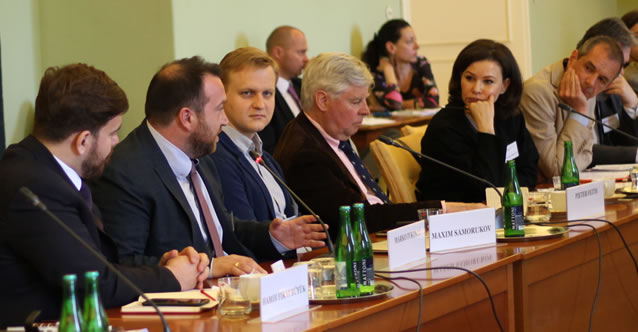Prague – ESI at conference on foreign influence in the Western Balkans

ESI deputy chairman Kristof Bender attended a conference on the influence of external actors in the Western Balkans, organised by the Prague Security Studies Institute (PSSI) and the Institute of International Relations (IIR) on 26 April 2019 in Prague.
Kristof spoke on the first panel titled "Western Balkans at the crossroads of external influences – Long-standing alliances or recent geopolitical games?" While other panelists talked mostly about Russia, Turkey and China, Kristof focused on the role of the United States.
He argued that the 20-year old EU-US consensus on Serbia, Kosovo and Bosnia is currently falling apart. President Trump's new National Security Adviser John Bolton has longstanding views on Kosovo and the EU. In 2008, he opposed Kosovo's independence. Once it was done, he made a case for Kosovo's further division. Since April 2018 he is now in a position to turn his views into US government policy.
Bolton also has a very different view of the EU than his predecessors. In his books and articles Bolton describes the EU as an ideological threat to US power. In 2007 he wrote about the EU's "calculated objective of increasing its influence at the expense of other blocks, and particularly at the expense of the United States." The US should "marginalise the EU, thus also frustrating their global governance agenda." For Bolton "global governance" is a threat to US sovereigny. And the EU "is the leading source of substantive globalist policies … [European elites] are not content with transferring their own national sovereignty to Brussels, they have also decided, in effect, to transfer some of ours to worldwide institutions and norms, thus making the European Union a miniature precursor to global governance." Since global governance is a threat to "American autonomy and self-government", weakening the EU becomes a US national interest. In July 2018 Trump declared that the EU was a "foe" of the US.
All this together means that the EU should question the still widely-held notion that the US is a reliable ally in the Balkans. It makes the need to get EU Balkan policy right all the more important.The EU should develop a credible roadmap for the period 2020-2025, beginning with the next European Commission and the Croatian and German EU presidencies:
- As full membership remains unlikely for any accession country before 2025 a concrete goal could be set for all Western Balkan countries that meet the required standards to become full members of the EU's common market by 2025. This would promote reforms and increase the attractiveness of the region for investors.
- In parallel to countries making measurable progress on reaching this goal, as well as making progress on the rule of law, minority rights and good neighbourly relations, they should be included in EU regional and cohesion policies.
- At the same time the EU should support the region moving towards a Western Balkans Schengen area by 2030, with the concrete goal of no further need for internal controls. Balkan borders should truly become invisible. This and minority rights, rather than changing borders to get rid of minorities, should transform the region's borders.
- Programme
- ESI report, The Hypnotist. Aleksandar Vucic, John Bolton and the return of the past (25 April 2019)
